Cauliflower Squash Casserole {Keto-Friendly}
This Cauliflower Squash Casserole is made with tender summer squash, sweet onions, and cauliflower rice smothered in a creamy cheese sauce, topped with ground pork rinds (or gluten-free panko), and baked until bubbly. Indulge in a low-carb, gluten-free, and keto-friendly version of the classic Southern side without sacrificing comfort!
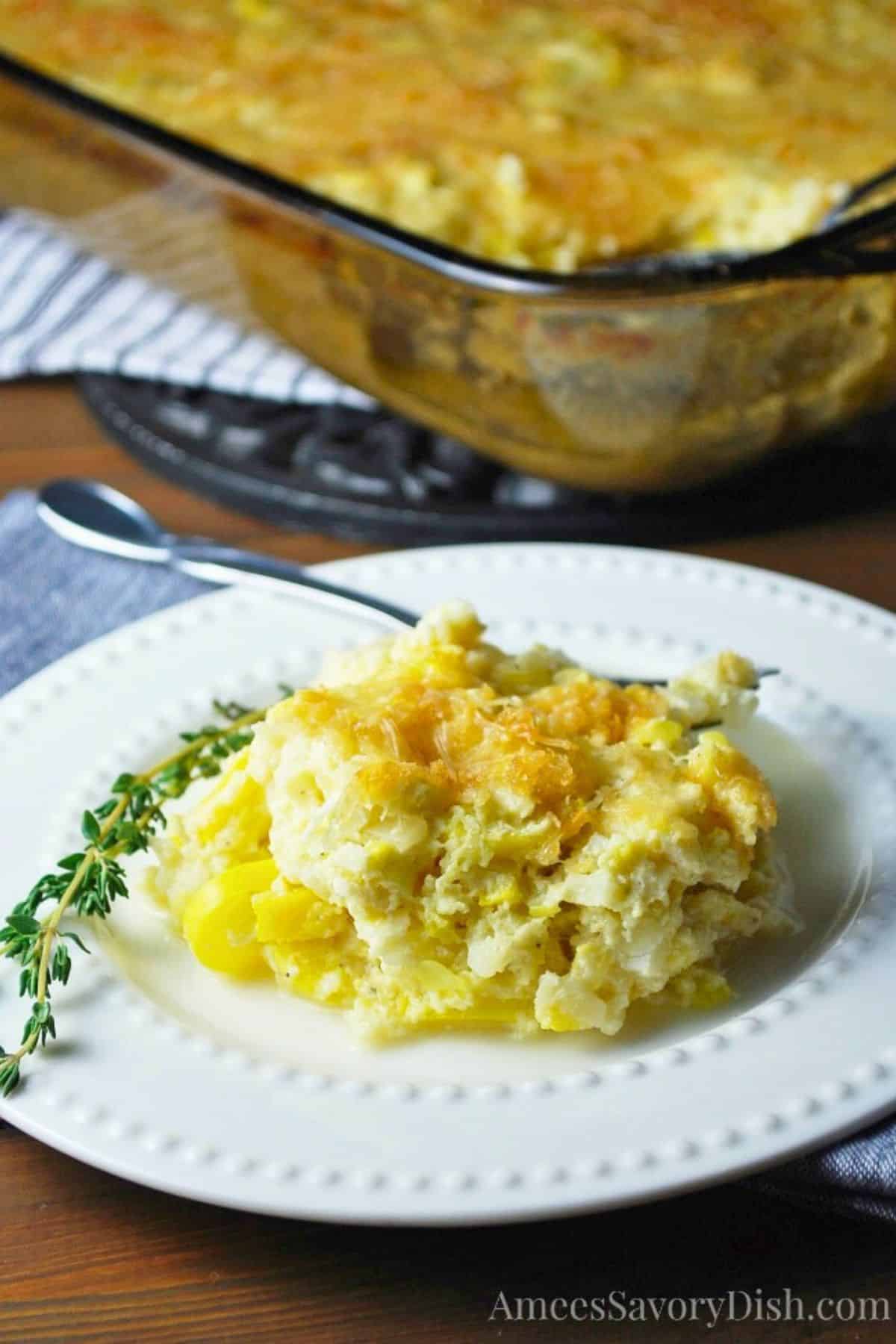
Back in 2011, I tried a classic summer squash recipe I found in the “Cooking Light Comfort Food” section of my local Georgia paper, and it instantly became a family favorite. But as much as we adored it, I couldn’t resist giving it a low-carb, keto-friendly makeover.
So, I swapped the traditional rice for cauliflower rice and the breadcrumbs for ground pork rinds, and voilà! The transformation was not only lower in carbs than the original recipe but perhaps even better.
We had leftovers and were honestly blown away by how the flavors developed overnight. Giving the ingredients more time to mingle resulted in an even creamier and more flavorful dish. Needless to say, this low-carb squash casserole proves that you don’t have to ditch your favorite comfort foods just because you’re lowering carbohydrates –cheers!
Recipe highlights
Low-carb casseroles, like this creamy cauliflower squash casserole, are my jam. Here’s why you should definitely try it if you haven’t already:
- Ideal for low-carb and gluten-free dieters. Indulge in the comfort of classic Southern summer squash casserole without the guilt or gluten. This keto-friendly version is low in carbs and safe for those who can’t consume gluten.
- Rich, creamy, and crunchy! Experience squash, onions, and cauliflower rice, all smothered in a decadent cheese sauce topped with crushed pork rinds –your taste buds will thank you.
- Easy prep, big flavor. With simple ingredients and straightforward instructions, it’s a breeze to make ahead or on a whim for busy weeknights, lazy weekends, or special occasions.
- Versatile side dish. Whether served with rotisserie chicken for a quick meal or as a side at your next summer gathering, this squash casserole complements any menu.
Ingredients and substitutions
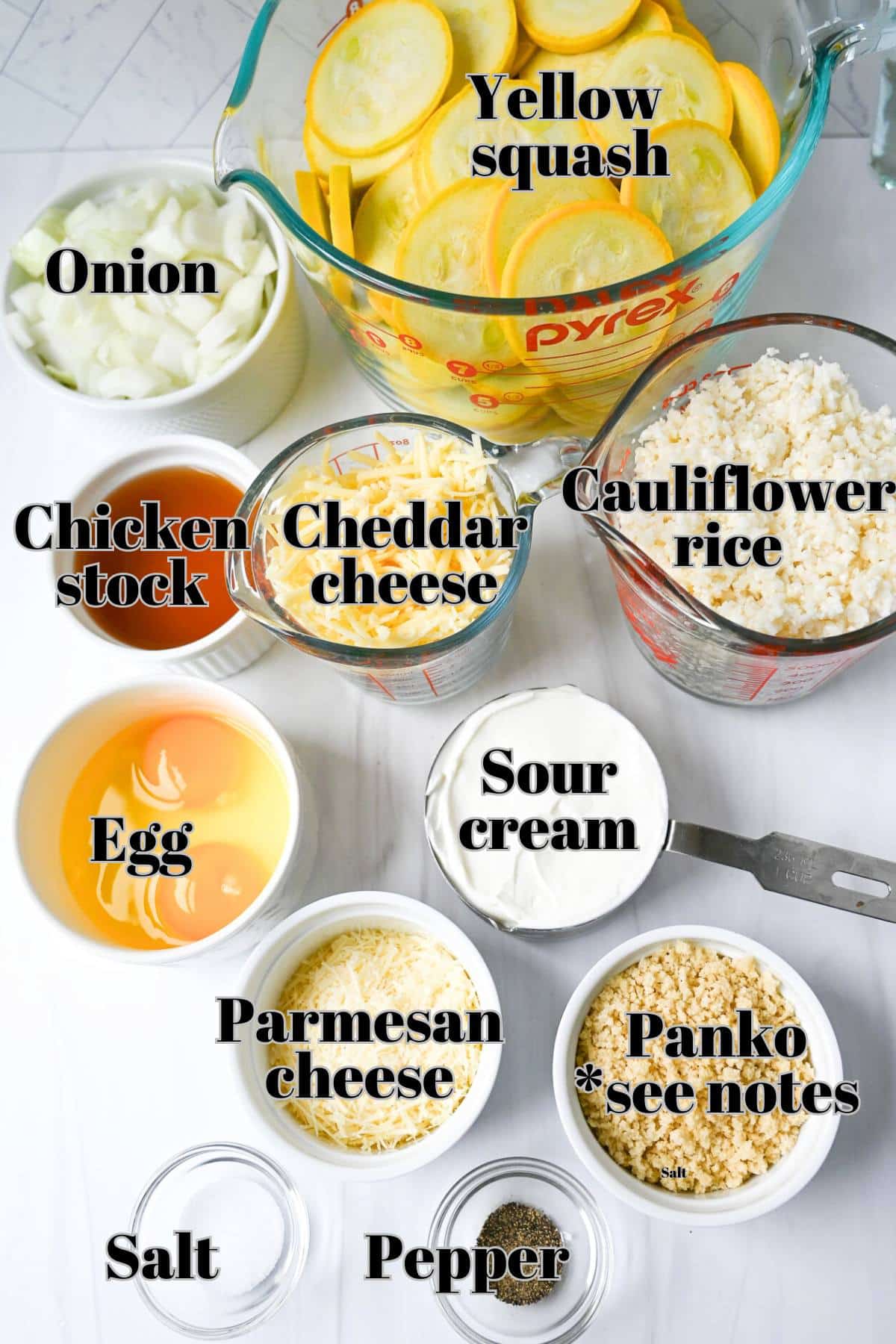
- Yellow squash. This low-carb veggie gives the casserole a hearty texture and delightful flavor. Plus, it’s a nutritional powerhouse packed with vitamins and dietary fiber. If yellow squash isn’t available, you can substitute zucchini or any other summer squash.
- Onion. While onions do contain some carbs, the amount used is minimal, keeping this dish suitable for the keto diet. For a milder flavor, opt for sweet onions, shallots, or green onions.
- Chicken stock. Or broth. To boil the squash and add depth of flavor without adding extra carbs. To control the salt content, use a low-sodium version.
- Cauliflower rice. This ingredient is common in keto kitchens because it mimics the texture of rice while being low in carbs and high in fiber. I use the bagged riced cauliflower from the produce section. It absorbs excess moisture nicely and cooks as the casserole bakes.
- Cheddar cheese. Opt for sharp varieties to bring a bold, cheesy flavor, or experiment with other types of melty cheese, such as Gouda, Mozzarella, or Swiss.
- Low-fat sour cream. I used low-fat sour cream, but you can use full-fat sour cream if you’re on a keto diet and wish to increase the fat content (or simply prefer a richer dish). Greek yogurt also works as a substitute for a high-protein option. If swapping with Greek yogurt, I’d recommend going with a full-fat version for creaminess and flavor. You could also do half and half.
- Parmesan cheese. Adds a nutty, salty dimension and helps form a golden crust when baked.
- Pork panko. Your carb-free, crunchy, flavorful alternative to traditional breadcrumbs! If pork panko is unavailable (or you’re not a fan), substitute gluten-free panko breadcrumbs or crushed pork rinds.
- Eggs. Beaten eggs help hold the casserole together and contribute to its richness.
- Sea salt and pepper. Use them to taste, adjusting the seasoning as needed. You can also experiment with other seasonings, such as garlic powder, paprika, or thyme.
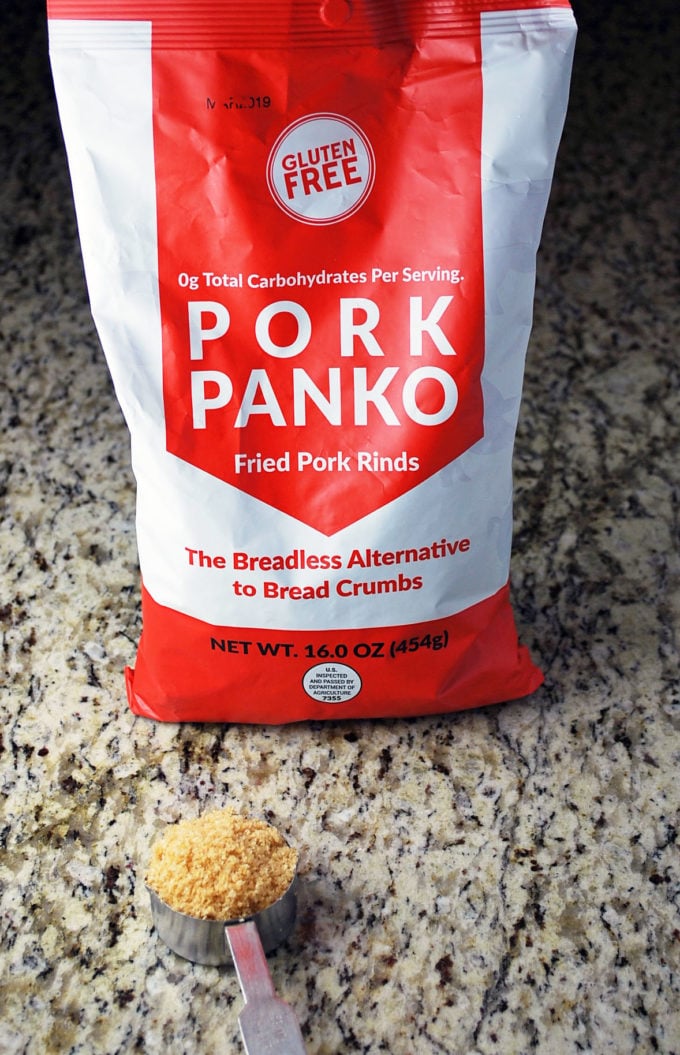
How to make squash casserole with cauliflower rice
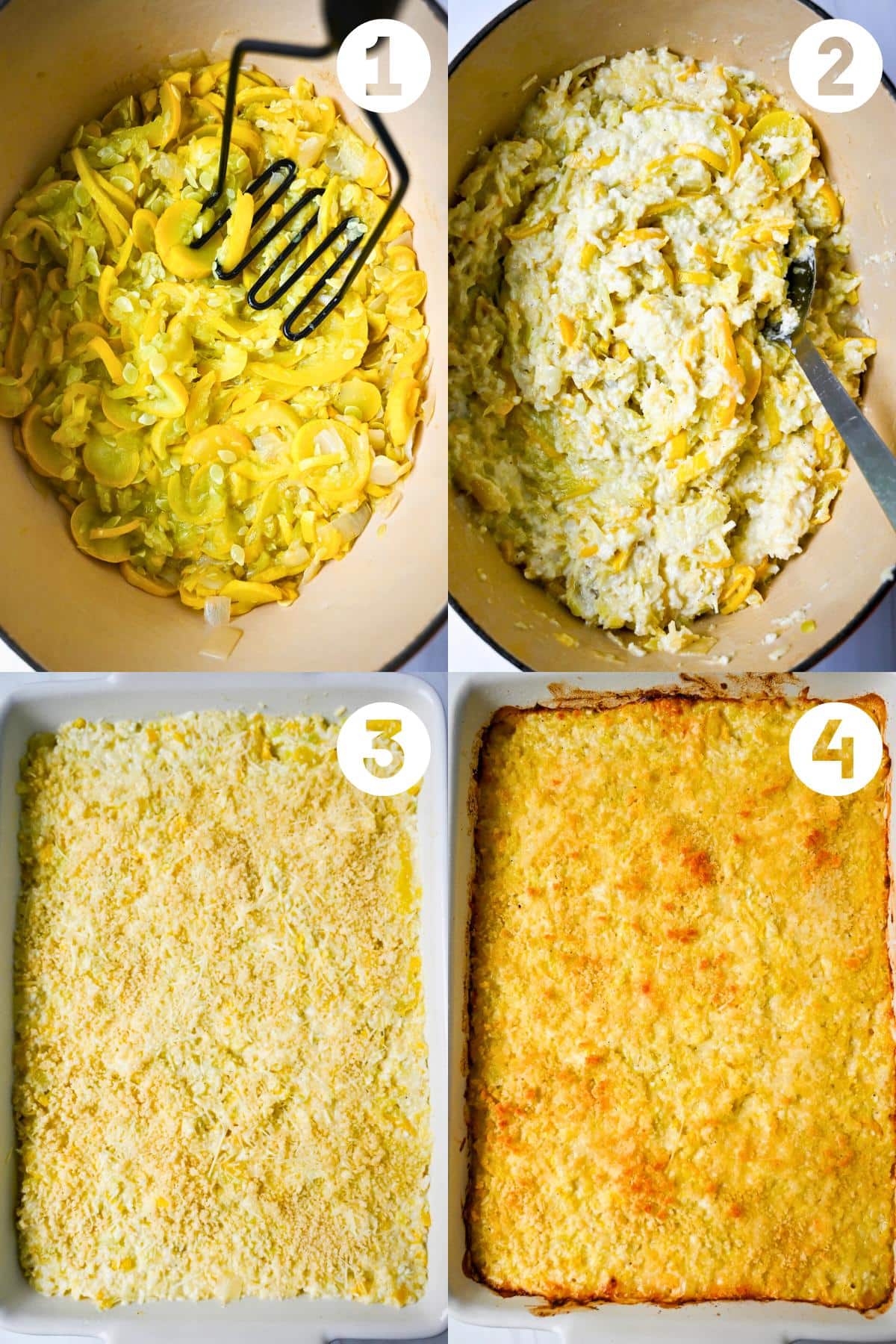
Step 1: Cook the squash and onions. Bring the squash, onions, and broth to boil in a large pot. Cover, reduce the heat, and simmer until tender. Drain well, pressing out any excess liquid, then partially mash with a potato masher.
Step 2: Combine casserole ingredients. Add the cauliflower rice, cheddar cheese, sour cream, half of the Parmesan cheese, half of the panko, and eggs to the pot. Season with salt and pepper, and stir gently to combine.
Step 3: Assemble the casserole. Spoon the mixture into a 9×13” greased baking dish and top with the remaining Parmesan and pork panko. If you are using gluten-free panko breadcrumbs, moisten them with a spritz of olive oil spray or toss them in melted butter to coat.
Step 4: Bake, then broil. Bake in the 350℉ preheated oven until bubbly, then broil for a minute or so to lightly brown the top. Watch carefully so it doesn’t burn.
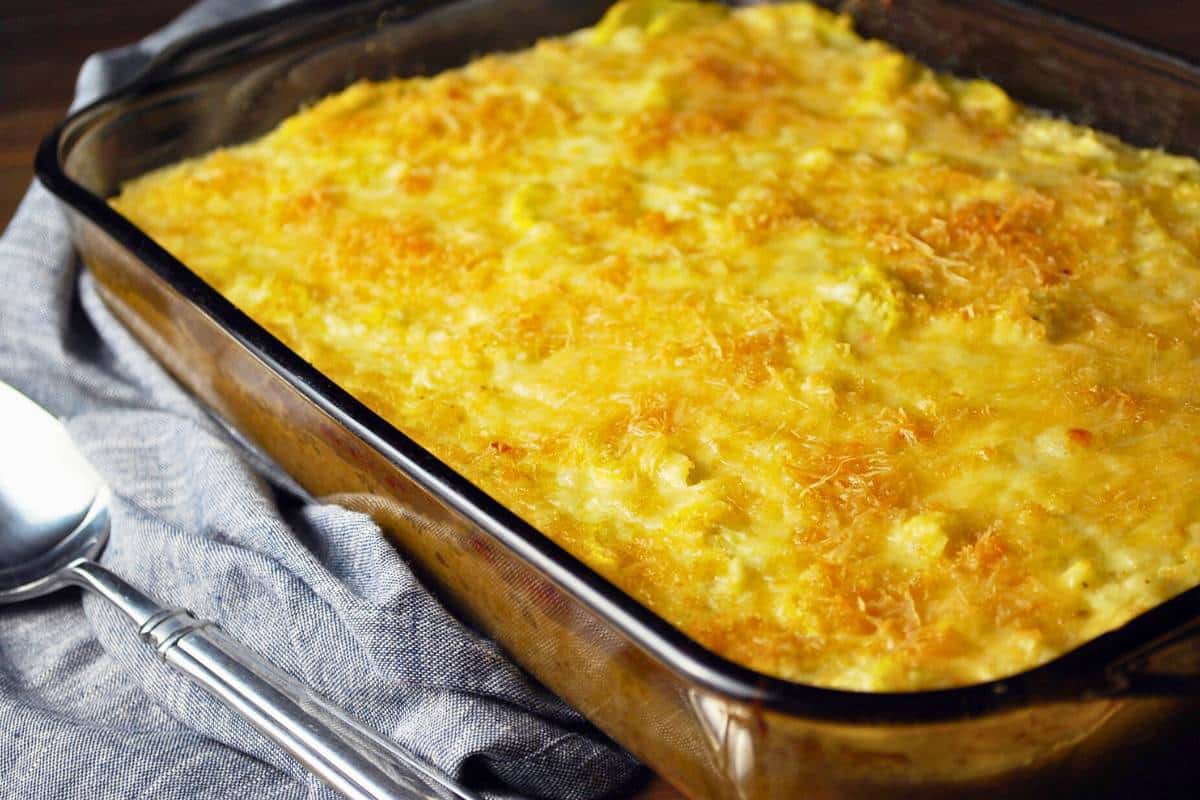
Recipe tips
- Rice your own cauliflower. These days, you can readily find raw riced cauliflower in the produce section of grocery stores, but it’s also super easy to make using a food processor. Simply pulse the cauliflower until it resembles the size and texture of rice.
- Drain excess moisture. Since squash contains a lot of water, it’s critical that you drain excess moisture after cooking it to prevent a watery casserole. Simply place the cooked squash in a colander and allow it to drain thoroughly before assembling the casserole.
- Let it rest. Resist the temptation to dig in immediately and give it a few minutes to cool slightly. This allows the flavors to meld together and the casserole to set, resulting in a more cohesive dish with better texture.
- To make ahead, follow the recipe instructions and assemble the casserole the day before, but don’t bake it. Instead, cover the dish and keep it in the fridge until you are ready to bake it. You can also bake it the day before and then reheat it in the oven before serving.
Recipe variations
Here are some creative customization ideas for your keto squash casserole:
- Make it meaty by adding crumbled cooked bacon or diced ham for an extra layer of smoky, savory flavor and protein.
- Spice it up by adding diced jalapeños, red pepper flakes, or a pinch of cayenne pepper. The kick of fiery flavor pairs perfectly with the creamy cheese sauce.
- For a vegetarian version, boil the squash and onions in vegetable broth and replace the pork panko with panko breadcrumbs or crushed almonds. You can also bulk it up with extra veggies like spinach and bell peppers.
Storing and freezing
Storing: Once your keto squash casserole has cooled to room temperature, transfer leftovers to an airtight container and store in the refrigerator for 3-4 days.
Freezing: Allow the casserole to cool completely before transferring it to a freezer-safe container. Store it in the freezer for 2-3 months. Thaw in the refrigerator overnight before reheating it in the oven or microwave.
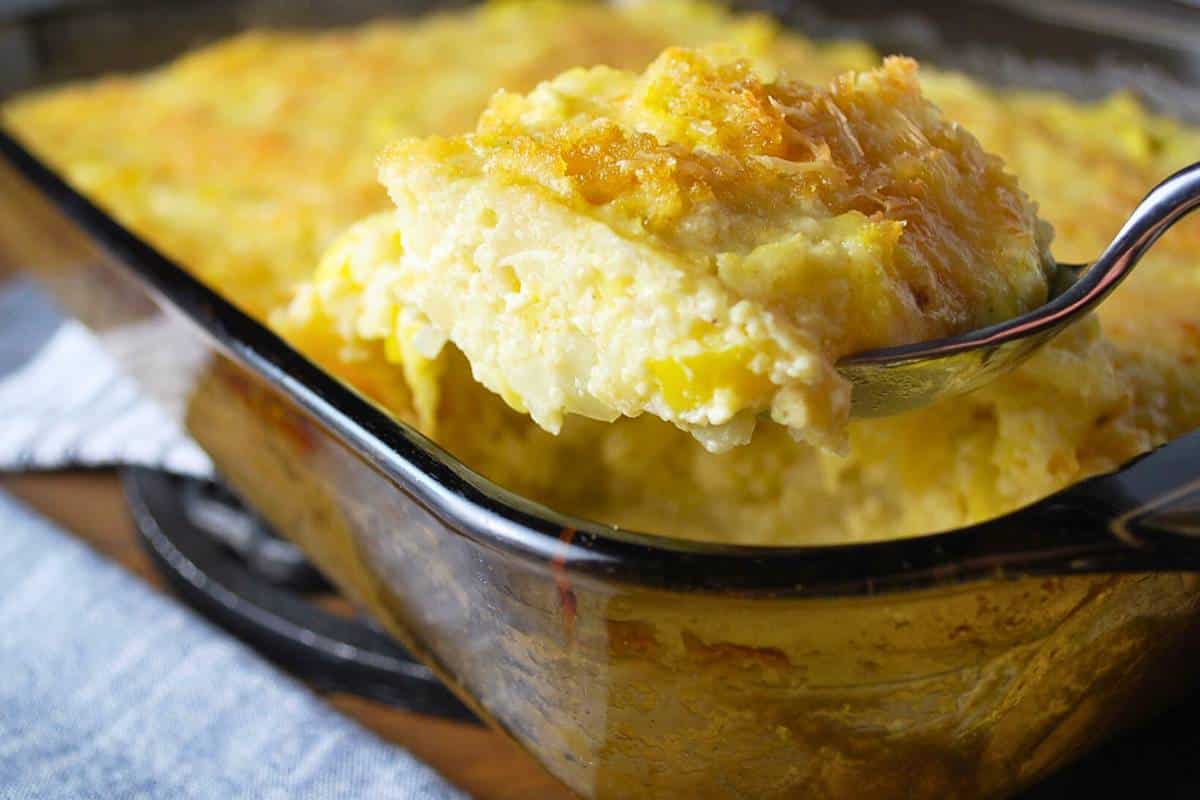
FAQ
To prevent your squash casserole from getting watery, start with fresh squash, which tends to have less moisture than older squash. After cooking the squash, drain any excess liquid thoroughly using a colander to prevent it from making the casserole soggy.
No. I highly recommend using raw, fresh, riced cauliflower. I’m afraid frozen cauliflower rice will release too much moisture into the casserole and make it soggy.
This casserole pairs well with a variety of main protein options, including grilled BBQ chicken, grilled salmon, grilled pork tenderloin, or steak. It also pairs well with vegetable sides like roasted broccoli, grilled asparagus, roasted Brussels sprouts, summer zucchini salad, or a mixed green salad. Non-keto diners, consider starchy sides like mashed potatoes and dinner rolls.
More gluten-free casserole recipes you’ll love
- Baked Cabbage Casserole
- Gluten-Free Broccoli Casserole
- Gluten-Free Chicken Divan
- Gluten-Free Chicken Butternut Squash Casserole
- Gluten-Free Sweet Potato Casserole
If you love this gluten-free and keto-friendly cauliflower squash casserole recipe, I would be so grateful if you could leave a 5-star 🌟 rating in the recipe card below. I love reading your comments and feedback!
Stay posted on my latest cooking adventures through social media @ Instagram, Pinterest, and Facebook. Also, don’t forget to tag me when you try one of my recipes!
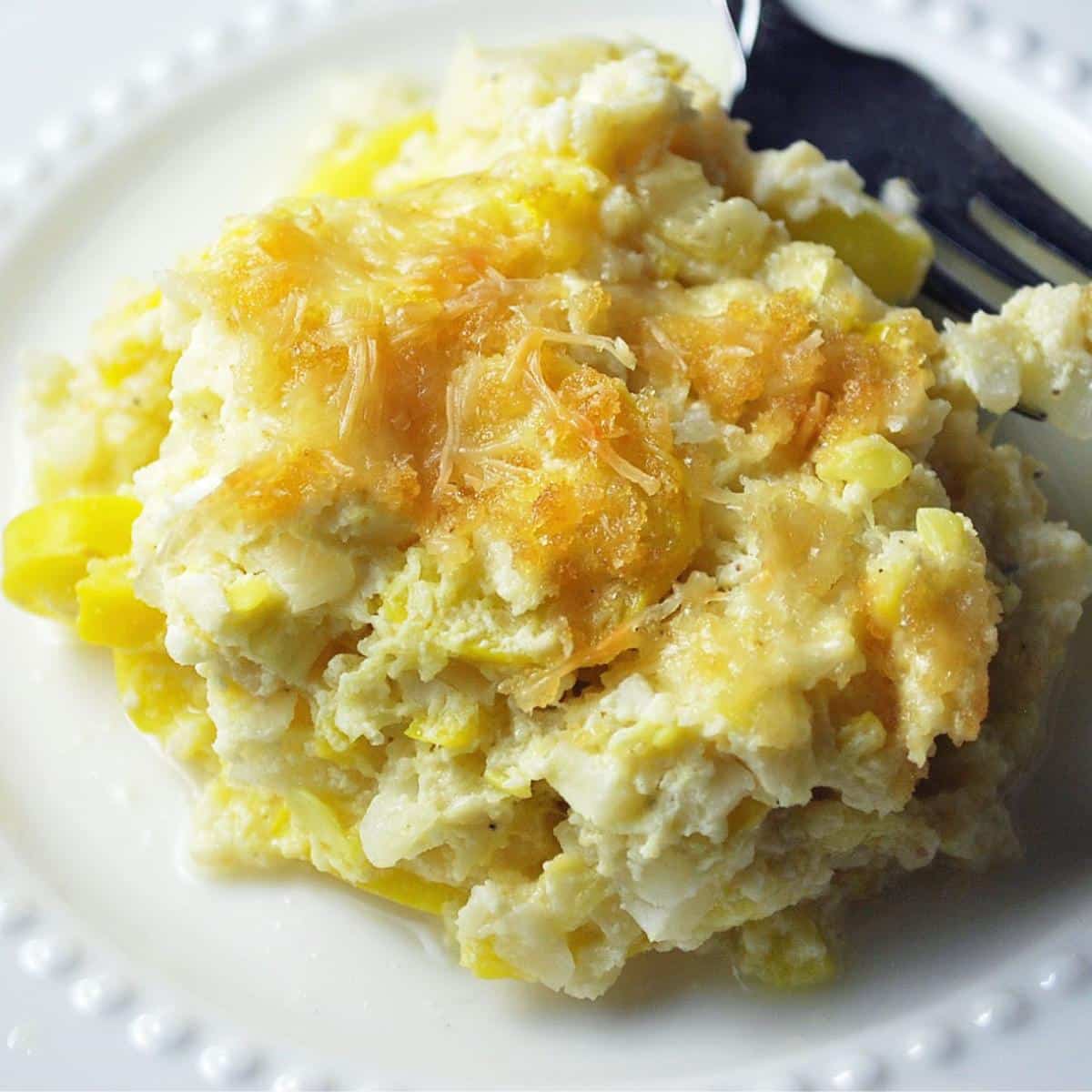
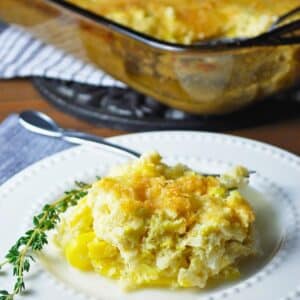
Cauliflower Squash Casserole
Ingredients
- 8 cups sliced yellow squash
- 1 cup chopped onion
- 1 ½ cups chicken stock or broth
- 2 cups cauliflower rice uncooked
- 8 oz block sharp cheddar cheese shredded
- 1 cup low-fat sour cream
- 1/4 cup freshly grated Parmesan cheese divided
- 1/2 cup pork panko *can also use gluten-free panko or bread crumbs
- 1 tsp sea salt
- 1/4 tsp pepper
- 2 lightly beaten eggs
Instructions
- Heat oven to 350 degrees.
- Combine squash, onion, and broth in a Dutch oven over high heat; bring to a boil. Cover, reduce heat, and simmer for 20-25 minutes or until tender.
- Drain well, pressing out any excess liquid then partially mash with a potato masher.
- To Dutch oven, add cauliflower rice, cheddar cheese, sour cream, 2 Tablespoons Parmesan cheese, 1/4 cup pork panko or GF panko bread crumbs, salt, pepper and eggs; stir gently.
- Spoon mixture into a 9×13 baking dish sprayed with olive oil spray. Sprinkle with remaining Parmesan cheese and 1/4 cup pork panko. If you're using panko bread crumbs, give them a spritz of olive oil spray to moisten (or toss with a little melted butter). Bake for 30 minutes or until bubbly. Broil for about a minute, or until lightly browned, watching carefully so it doesn't burn.
Notes
- Rice your own cauliflower. These days, you can readily find raw riced cauliflower in the produce section of grocery stores, but it’s also super easy to make using a food processor. Simply pulse the cauliflower until it resembles the size and texture of rice.
- Drain excess moisture. Since squash contains a lot of water, it’s critical that you drain excess moisture after cooking it to prevent a watery casserole. Simply place the cooked squash in a colander and allow it to drain thoroughly, pressing out any excess moisture with the back of a spoon, before assembling the casserole.
- Let it rest. Resist the temptation to dig in immediately and give it a few minutes to cool slightly. This allows the flavors to meld together and the casserole to set, resulting in a more cohesive dish with better texture.
- To make ahead, follow the recipe instructions and assemble the casserole the day before, but don’t bake it. Instead, cover the dish and keep it in the fridge until you are ready to bake it. You can also bake it the day before and then reheat it in the oven before serving.
Nutrition
- Easy Eggnog Cupcakes with Spiced Rum Whipped Cream Frosting (Alcohol-Free Recipe) - December 15, 2025
- Southern Healthy Fried Chicken - November 10, 2025
- Ground Beef Breakfast Casserole - November 5, 2025

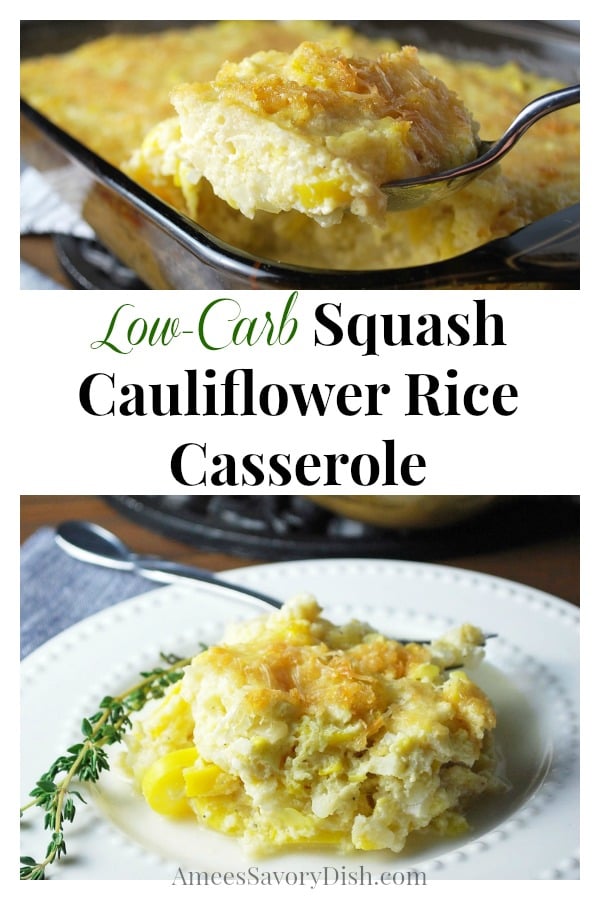
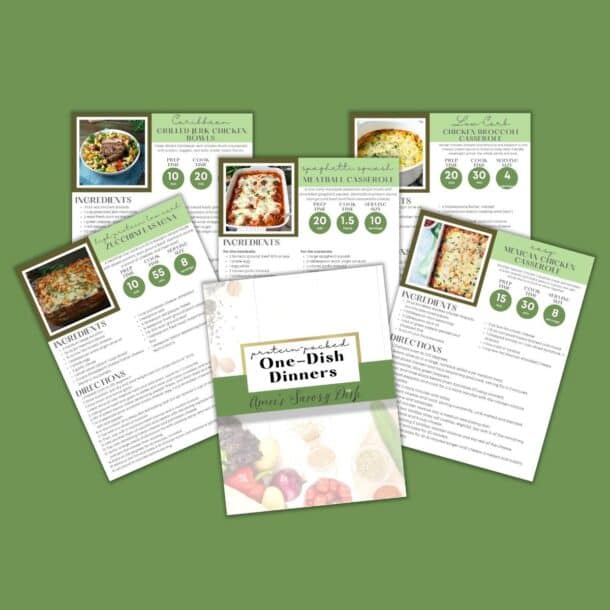
this is super yummy, had it as a main for dinner and made my own breadcrumbs otherwise simply followed the recipe
Hi Megan! Thank you so much for the feedback. Homemade breadcrumbs sound delicious!
I sure wish that when someone leaves a comment that he or she had actually tried the recipe – yes, it sounds great, but make it and let us know. not one person here has actually tried the recipe
I agree, Betsy! I would love the feedback! If you make it, please keep me posted. We adore this dish.
Haven’t tried it yet but it looks delicious – can this recipe be frozen? Thanks in advance. Blessings Vanessa
Hi Vanessa! I hope that you give it a try! I haven’t tried freezing this casserole, but I’m not sure how the texture would be frozen then reheated since cauliflower has a high water content. If you freeze it, I would thaw it overnight in the refrigerator before reheating.
This looks AWESOME! 🙂
Just popped in from the zucchini blog hop!I love this idea for zucchini!
Oh yum!!!
This looks delicious! I made a similar rice dish last week but didn’t put cheese on- GREAT idea! I’ll have to use your recipe 🙂 Thanks for using Cabot cheese, the farm families who own Cabot appreciate your support!
~Jacquelyn
I’ve learned that if I add cheese to veggies / grains, my kids will eat just about ANYTHING. This looks great for a weeknight meal. Thanks for sharing.
I’m sure it is wonderful and I will have to try it soon. Thanks –